VyprVPN has been around for over a decade and has always been a solid choice for almost any user. However, in the last two years, its app has undergone a facelift, and performance has further improved, making it a real contender for your dollars.


VyprVPN
VyprVPN is an old-school VPN with a revamped, modern look and feel. It’s fast, and comes at a great price.
- Great app
- Good pricing
- Fast
- Not as fast as some
- Connection speed slows down at times
Using the VyprVPN App
VyprVPN has been around for a long time now but has never rested on its laurels. Case in point is the massive upgrade the app has undergone since I last reviewed the service. I really like the new VyprVPN app. It’s sleek and modern and one of the few VPN apps I tested recently that actually feels like something designed in the past few years.
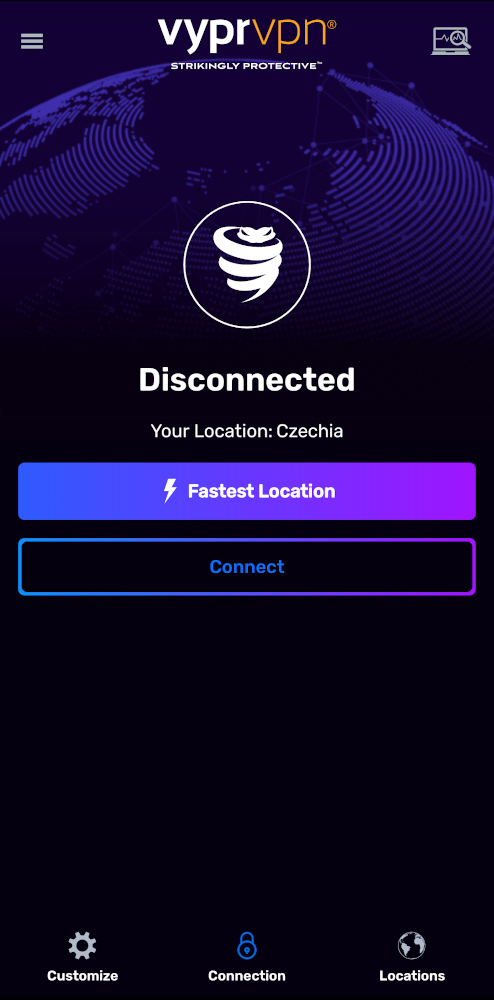
Currently, the app is available on desktop for Windows and macOS, while mobile users have apps for Android and iPhone. Unlike many of its competitors (read my ExpressVPN review for one example), VyprVPN does not offer a cornucopia of install options, so if you have a more exotic device or OS, it may not be the best pick.
Using the app is simple—it really has just a few buttons. The top button lets you select a server, while the one below it connects you to it. I like apps that keep things this simple; VPNs are straightforward programs; there is no need to complicate matters.
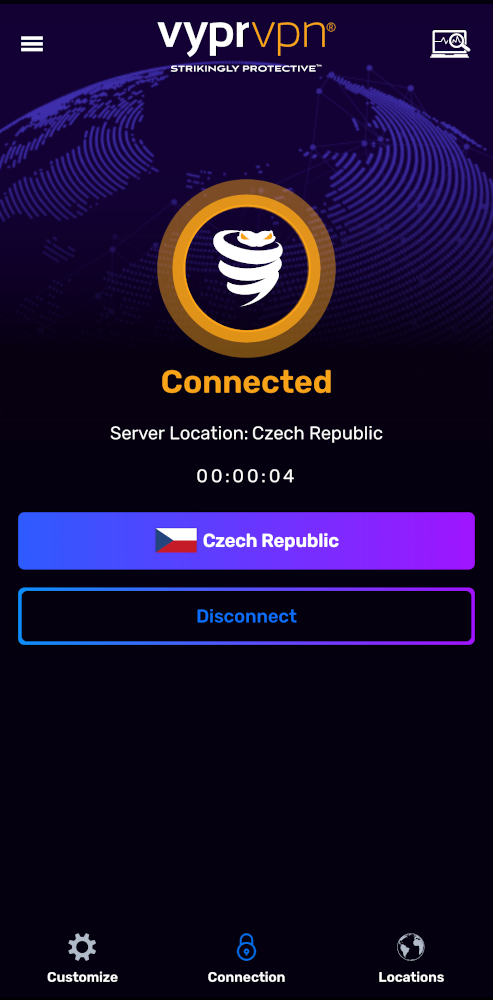
Connection times are really good, and I like the animation that plays, with the viper on the logo acting as a loading button. Usually I’m not a fan of animations, but I feel VyprVPN hits just the right note with it. For some reason, though, disconnecting from a server can take some time, but it’s nothing too serious.
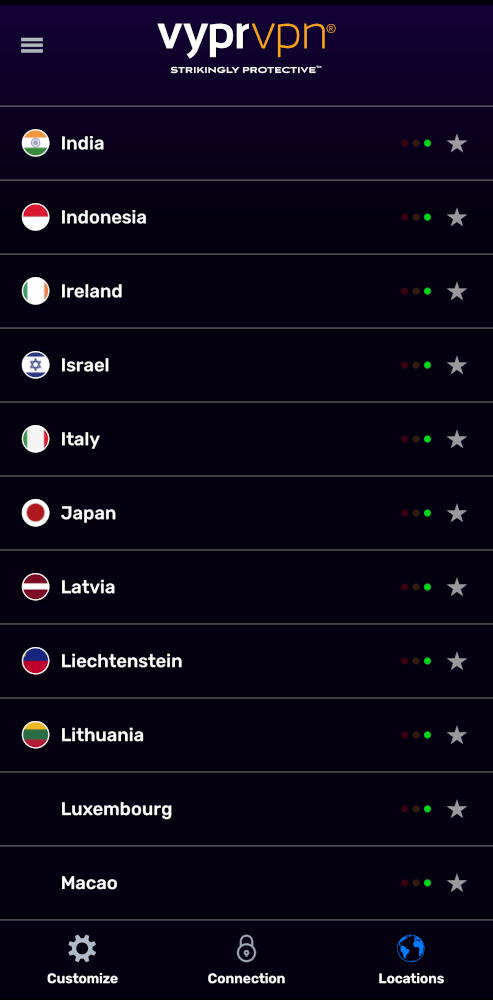
The server spread is also decent, with most parts of the globe accounted for. I like how it’s all one big list: if a country has more than one location, it’s a separate entry; there are no sublists. This speeds up navigation a lot; there is no searching too long for a specific server. That said, I do wish there were more filter options.
The settings screen is equally straightforward, with most options being fairly self-explanatory. I like how you can quite easily set which apps will use the VPN and which won’t, offering you some nice built-in split tunneling.
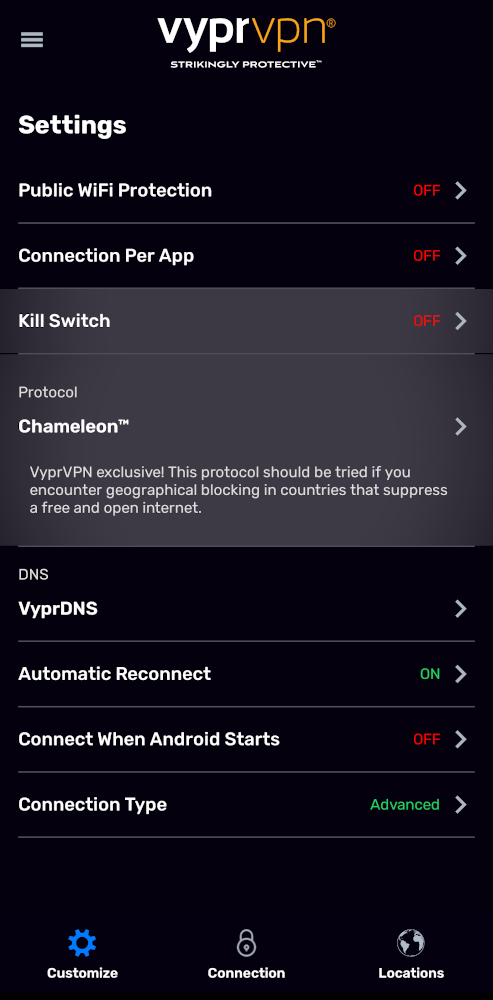
My only issue with the app is that the kill switch isn’t on by default, a security flaw I complain about a lot in most of my reviews. It’s important to always have it on, as it “kills” your internet connection if there’s ever an issue with your VPN. This is pretty vital if you’re doing anything that could land you in hot water.
Other than that, I think the VyprVPN app is pretty great. It’s sleek and well-designed, and I didn’t encounter anything that made me wonder why it was designed this way—no mean feat, that. If ease of use is a priority for you, VyprVPN may be a great choice.
Speed and Performance
VyprVPN performed well, though it’s no top-tier VPN in terms of speed—those accolades go to ExpressVPN and Proton VPN. I was quite pleased with the results of my testing. As usual, when testing VPN speed, I set a baseline from my home in Prague, Czechia, without a VPN, and then connected to locations around the world to see how much my speed dropped. For these tests, I used VyprVPN’s default WireGuard protocol.
|
Location |
Ping (ms) |
Upload (Mbps) |
Download (Mbps) |
|---|---|---|---|
|
Czechia (unprotected) |
9 |
160 |
59 |
|
Czechia |
42 |
147 |
55 |
|
United Kingdom |
44 |
141 |
55 |
|
New York City |
131 |
148 |
5 |
|
Japan |
262 |
112 |
52 |
The big drop is, as always, the connection to Japan, which is half a world away. The other measurements are pretty good, with the U.K. oddly worse than the connection to the Big Apple. Overall, the drop in speed is a very reasonable 10 to 20%, though that sharp increase in ping does bar VyprVPN from a spot on our roundup of the best VPNs for gaming.
Still, for the price, this is a great performance. Cheaper VPNs often skimp on servers, which clearly isn’t the case here. If you don’t want to spend too much but still need good performance, VyprVPN seems to be a solid choice.
What Does VyprVPN cost?
VyprVPN’s pricing is pretty good, considering what you get for it, and it’s pretty straightforward, without any bundles like Proton VPN or NordVPN offer. You can sign up for either a month, one year, or two years. Each plan offers the same features.
At $72 for two years, VyprVPN is a steal; $36 per year puts it firmly among the best budget VPNs and a worthy contender if you ever want a VPN that gets the job done for cheap, but without too many frills.
In fact, the two-year plan is so good that I don’t see why you’d shell out $60 for the annual plan; it just doesn’t seem worth it. The same goes for the monthly plan: while $10 is a pretty good price, there’s no real benefit in signing up for just one month (though you can read about one exception in my Mullvad review).
Privacy and Security
VyprVPN seems both private and secure. I say “seems” as it’s always going to be something of a leap of faith to truly trust your VPN. Still, the service ticks all the right boxes. The Golden Frog’s (VyprVPN’s parent company) privacy policy is thorough without too much woolly language. This gives me the impression it’s trying to inform without obfuscating what’s going on. A good sign.
Most importantly, VyprVPN hasn’t experienced any scandals in its long history. In an industry where much of the core tech is hidden behind a veil of secrecy, checking whether there have been any leaks, breaches, or other things of that nature is the only real yardstick we have of whether a service is as good as it claims to be. VyprVPN passes that test with ease.
VyprVPN Security
When it comes to security, VyprVPN ticks all the right boxes. It allows you to choose from three VPN protocols: the very fast and secure WireGuard, the slightly slower but equally secure OpenVPN, and VyprVPN’s very own Chameleon protocol, which the company claims is better at not just getting around internet censorship blocks but also remaining hidden while doing so.
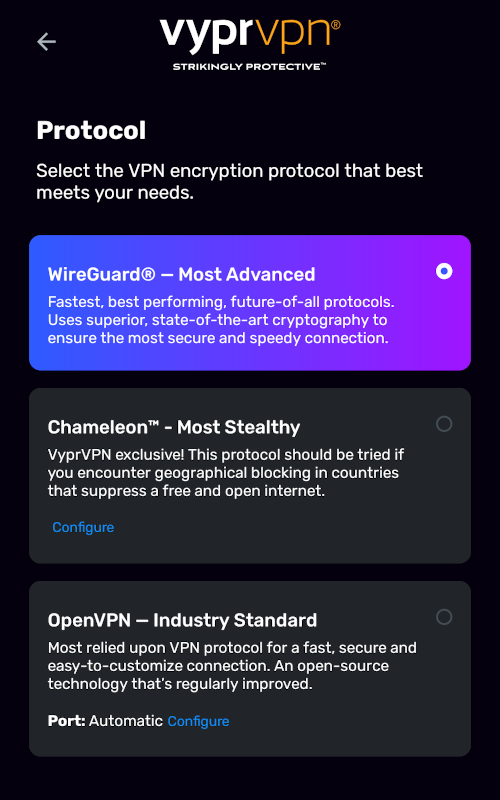
Technically, the way WireGuard works means it should be able to get you past blocks. However, the connection can be easily identified as coming from a VPN, making it less than ideal for tunneling under the Great Firewall of China and similar obstacles. Using a protocol that can mask itself should fix this issue, but it’s hard to be sure that it actually works—that issue of trust again.
Still, if you’re looking to access the “real” internet from China or other places, VyprVPN seems to be a good option (read my Proton VPN review for another). I especially like it because, unlike many of these obfuscation protocols, Chameleon is fast and only slightly slower than WireGuard.
Should You Subscribe to VyprVPN?
I’ve always liked VyprVPN, and after writing this review, I like it even more. It’s gotten a little faster since I last tested it, and the app’s facelift was very welcome. Where it was a solid contender before, it’s become a service that stands out thanks to good performance and a great price. It’s probably my favorite app on the market right now.
This means VyprVPN easily defends its spot in our ranking of the best VPNs and maybe even elbows aside a few contenders that haven’t made the same strides. I recommend that anybody shopping for a VPN at least check it out.


VyprVPN
VyprVPN is an old-school VPN with a revamped, modern look and feel. It’s fast, and comes at a great price.





